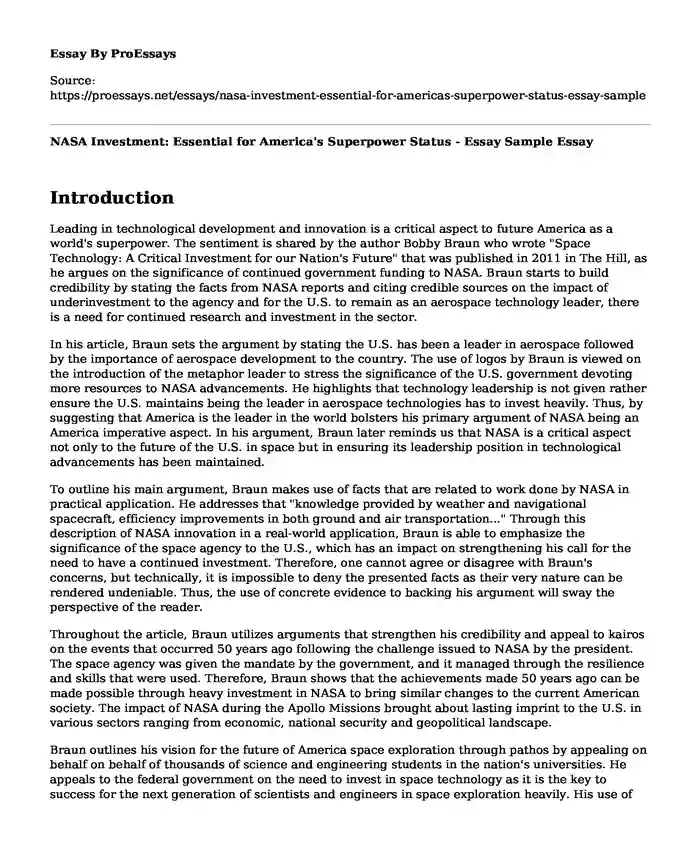Introduction
Leading in technological development and innovation is a critical aspect to future America as a world's superpower. The sentiment is shared by the author Bobby Braun who wrote "Space Technology: A Critical Investment for our Nation's Future" that was published in 2011 in The Hill, as he argues on the significance of continued government funding to NASA. Braun starts to build credibility by stating the facts from NASA reports and citing credible sources on the impact of underinvestment to the agency and for the U.S. to remain as an aerospace technology leader, there is a need for continued research and investment in the sector.
In his article, Braun sets the argument by stating the U.S. has been a leader in aerospace followed by the importance of aerospace development to the country. The use of logos by Braun is viewed on the introduction of the metaphor leader to stress the significance of the U.S. government devoting more resources to NASA advancements. He highlights that technology leadership is not given rather ensure the U.S. maintains being the leader in aerospace technologies has to invest heavily. Thus, by suggesting that America is the leader in the world bolsters his primary argument of NASA being an America imperative aspect. In his argument, Braun later reminds us that NASA is a critical aspect not only to the future of the U.S. in space but in ensuring its leadership position in technological advancements has been maintained.
To outline his main argument, Braun makes use of facts that are related to work done by NASA in practical application. He addresses that "knowledge provided by weather and navigational spacecraft, efficiency improvements in both ground and air transportation..." Through this description of NASA innovation in a real-world application, Braun is able to emphasize the significance of the space agency to the U.S., which has an impact on strengthening his call for the need to have a continued investment. Therefore, one cannot agree or disagree with Braun's concerns, but technically, it is impossible to deny the presented facts as their very nature can be rendered undeniable. Thus, the use of concrete evidence to backing his argument will sway the perspective of the reader.
Throughout the article, Braun utilizes arguments that strengthen his credibility and appeal to kairos on the events that occurred 50 years ago following the challenge issued to NASA by the president. The space agency was given the mandate by the government, and it managed through the resilience and skills that were used. Therefore, Braun shows that the achievements made 50 years ago can be made possible through heavy investment in NASA to bring similar changes to the current American society. The impact of NASA during the Apollo Missions brought about lasting imprint to the U.S. in various sectors ranging from economic, national security and geopolitical landscape.
Braun outlines his vision for the future of America space exploration through pathos by appealing on behalf on behalf of thousands of science and engineering students in the nation's universities. He appeals to the federal government on the need to invest in space technology as it is the key to success for the next generation of scientists and engineers in space exploration heavily. His use of words "foundation for humanity's great leap" and "key ingredient to their success" are effective in showing why it is significant to invest in the country's future space endeavors that will ensure America retains a technological leadership position. Braun maintains a strong use of pathos through emotionally charged words and phrases that imply aerospace remaining as America's strongest national fabric component. He notes that the leadership in aerospace is not given and to remain in that position presents the need for continued investment that will create breakthroughs for tomorrow.
The use of ethos by Braun shows that the goal of advancing aerospace progress has already been attained in the past, and he holds the belief that it can still be attained today. Through his reference to the success achieved by NASA in the past shows that investing heavily in aerospace will have similar impacts on the present especially to upcoming experts. Braun shows that the pursuit of space exploration was already attained previously, and he is more confident that NASA can follow a similar venture. Even though progress is still lacking in space exploration efforts, there is still a possibility of making advancements in the coming future.
Though Braun starts the article by showing the readers that America is the leading country in space exploration, it is however underinvesting in aerospace, which will have an impact on its future endeavors made by NASA. As shown by Braun, NASA is the embodiment that defines the country's premier research and development that offers breakthrough on aeronautics and space frontiers. The essay has shown effectiveness in the manner in which logos, pathos and ethos have been utilized to appeal to the need to have continued investment in NASA space exploration programs that define America supremacy in aeronautics innovation.
Work Cited
Braun, Bobby. Space technology: A critical investment for our nation's future. The Hill. 28 Oct 2011. Web 19 Feb 2014.
Cite this page
NASA Investment: Essential for America's Superpower Status - Essay Sample. (2023, Apr 08). Retrieved from https://proessays.net/essays/nasa-investment-essential-for-americas-superpower-status-essay-sample
If you are the original author of this essay and no longer wish to have it published on the ProEssays website, please click below to request its removal:
- Trump's Acceptance Speech Analysis
- Digital Diplomacy Essay
- Implementation of State Policies Paper Example
- Private Contractors in Combat Environments Paper Example
- Essay Sample on 1960 Democratic Party Platform
- US 2020 Elections - Essay Example
- Unveiling the Racial Contract: Charles Mills' Critique of Social Contract Theory and Injustices - Report Sample







